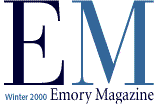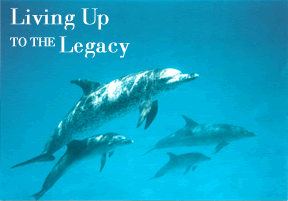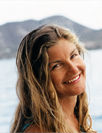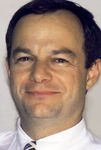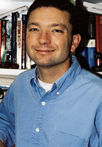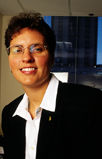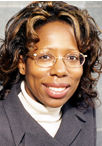|
|
||||||||||
|
Volume
75 Enigma: The Haunting of Uppergate House Wonderful
Woodruffs
Who are these Woodruffs, and what have they accomplished since leaving the University? The following are just a few of the young alumni who came to Emory because of that generous endowment established twenty years ago.
“That
kind of lofty, scholarly–almost Renaissance–atmosphere
that I found through my connection with the Woodruff
Fellowship, I’ve not really been able to
|
THE WATERS OFF THE COAST OF GRAND BAHAMAS ISLAND are twenty feed deep, turquoise, and warm. Beneath the shimmering waves swim communities of free-ranging spotted dolphins. Every summer, Ann Charity Weaver ’99PhD and her “research assistants”–small groups of ecotourists–dip into these waters to swim with these dolphins and to watch them make peace with one another. “Dolphins in the ocean have conflict like the rest of us. But they also have to live in a social group. If they don’t, they’re a shark sandwich,” says Weaver, whose work is based on the premise that all behavior, animal or human, is biological.
She believes that hormones and survival instincts dictate how a creature acts and reacts in social situations, and she studies animals to discover the “universal truths” of behavior. (“Animals, unlike humans, can’t tell you their version of the story,” she says.) Before earning her Ph.D. from Emory last spring, she studied peacemaking among primates under Charles Howard Candler Professor of Primate Behavior Frans de Waal at Emory’s Living Links Center. In November, Weaver joined the Developmental Psychobiologist Research Group at the University of Colorado at Denver. There, she is venturing into the human realm by studying conflict resolution among children. “There are physiological reasons for making up after a fight. Dolphins do reconcile. So do primates. They find each other and do something friendly, maybe groom each other,” she says. “So how do some people learn to be a peacemaker, while other people never learn to resolve conflict. . . ? Why did Littleton, Colorado, happen? Kids are not blending into society. . . , and I’m trying to find out what’s going on here.”
Weaver is one of a small group of alumni whose years at Emory were financed by the Emily and Ernest Woodruff Endowment Fund. Within every school at Emory, the Woodruff scholarship and fellowship programs–made possible these last two decades by more than $45 million from the Woodruff endowment income–serve as the cornerstone for recruiting and enrolling candidates who astonish selection committees, challenge professors, and inspire fellow students. Who are these Woodruffs, and what have they accomplished since leaving the University? The following are just a few of the young alumni who came to Emory because of that generous endowment established twenty years ago.
The soft Bolivian accent of Misha Pless ’90MD floats over the telephone lines from Pittsburgh, where he is director of neuro-ophthalmology at the University of Pittsburgh Medical Center. John Stone, associate dean and director of admissions at the Emory School of Medicine, describes Pless as “a rising star in his field.” Pless prefers to discuss his career–including three years at the Longwood Neurological Training Program at Harvard Medical School–in terms of his formative experiences as a Woodruff Fellow. “That kind of lofty, scholarly–almost Renaissance–atmosphere that I found through my connection with the Woodruff Fellowship, I’ve not really been able to find again. I have extremely warm and positive feelings about that whole period in my life,” says Pless, who was selected for a Woodruff after completing a triple major at Stanford University in history, biology, and chemistry. In his youth, Pless dreamed of becoming a concert pianist, and he continued to concertize while studying medicine at Emory. He took a year off from medical school to conduct a research project for the U.S. Centers for Disease Control and Prevention on the prevalence of the parasitic Chagas disease in his native Bolivia. His fascination with the brain, however, led him back into medicine, and he now spends his days teaching neuro-ophthalmology and solving what he calls the “diagnostic conundrums” presented by brain diseases that affect vision, including multiple sclerosis, stroke, and tumors.
Kathy McLane Gersch ’94MBA returned to Goizueta Business School last March from cloud-covered Seattle for her second Woodruff Weekend–this time to sit on the other side of the table as an interviewer for the school’s selection committee. “I like to feel as if I’m giving back, because I do appreciate the fellowship and what it did for me,” says Gersch, vice president of finance and strategic planning for the Nordstrom Product Group, one of five business units at Nordstrom and nearly a billion-dollar business. “Part of my contribution is continuing to be successful and be an example of what Woodruff Fellows can go on to do.” Describing her responsibilities as those of a “CFO of sorts,” the thirty-one-year-old Gersch analyzes growth, decides where and how to expand business, and builds brand strategies for her group’s various product lines–the “store brand” shoes, accessories, and clothing that represent twenty to thirty percent of the products available in Nordstrom stores and catalogs and online. She and her team recently signed a deal to market two Nordstrom brands in two department store chains in Japan, and she’s looking to expand Nordstrom’s “boutique strategies” in the United States. Julie Barefoot, assistant dean and director of admissions and career management, describes Gersch as young and confident, a risk-taker and a natural leader–“exactly the type of businessperson who exemplifies the Goizueta Woodruffs.”
L. Marie Smith ’99MSN, a family nurse practitioner and nurse midwife with Northside Hospital and Roswell Ob/Gyn in Atlanta, defines her vocation as “a willingness to establish intense relationships with people.” “Nurses establish powerful bonds with human beings at incredibly scary times–when others would walk away, when things get gross or they don’t smell good, when they’re scary, when someone’s being born or dying. We’re the one group that stays around through every minute of it.” Passionate and contemplative, Smith has many times been moved to write poetry by the intensity of her experiences in nursing. “There is something missed today,” she wrote in “Katy,” a tribute to a miscarried child, “a lost presence among us / the air waited to fill you, / and we silently counted your fingers and toes.” Her writing has been featured in Midwifery Today, the Atlanta literary journal bluemilk, and Parenthood Lost: A Gathering of Hope, a collection edited by Harvard ob/gyn Michael Berman. Smith aspires to be not only an exemplary caregiver but also a leader in her field, goals that have been independently praised by Marla Salmon, the recently arrived dean of the nursing school, who has outlined a strategic plan to reinvent the school as a training ground for nurse-leaders. In addition to fulfilling her nursing duties, which can stretch into shifts as long as thirty-four hours, Smith volunteers at a center for abused children and advocates for legislation to give Georgia nurses the ability to write prescriptions. (Georgia is the only state that still prevents nurses from doing so.)
In many ways, Talmage A. Stanley ’86T-’96PhD has come full circle. As director of the Bonner Scholars Program and volunteer service coordinator for the Appalachian Center for Community Service at Emory and Henry College in Emory, Virginia, Stanley works a stone’s throw from the dorm room where, his senior year, he learned he had been selected as a Woodruff Fellow by the Candler School of Theology. Stanley oversees a campus-wide initiative to build a “culture of service” at his undergraduate alma mater, duties which include supervising the community-service efforts of scholarship students. He coordinates all service-learning placements, leads student reflection groups, and builds collaborative service partnerships with rural communities in southwest Virginia. Several of his advisees have come to Candler to study theology. Mary Lou Greenwood Boice, Candler associate dean of admissions, describes Stanley as “deeply reflective.” (“That means I’m an introvert and a curmudgeon,” quips Stanley.) The grandson of a coal miner, Stanley served as a parish minister in Wythe County, Virginia, for five years and then returned to Emory to earn a Ph.D. in American Studies in the University’s Graduate Institute of the Liberal Arts. He was awarded a Mellon Fellowship and completed a dissertation on the connections between place, culture, politics, and family stories in Appalachia, using letters and photos from his own family history as a framework for his writing.
Philip E. Manley ’89Ox-’91C-’95M has the kind of accent some would call “country.” Twice selected a Woodruff–first by Oxford College and again by the School of Medicine–this Homerville, Georgia, native is soft-spoken and modest. Having completed a residency in family medicine, Manley has made his home in Greenville, South Carolina, and is halfway through a second residency in pediatrics. On the brink of choosing a career path, Manley says he wants to explore options other than private practice. “From a spiritual standpoint, there may be other opportunities I’m involved in when I’m done. Not necessarily mission work, but perhaps working with underprivileged children or parenting programs here in Greenville.” Manley fondly recalls his Oxford days as a Habitat for Humanity volunteer. “The Oxford Scholars Program was real active in the community,” he says. “Oxford had a different emphasis–aside from education, there was the sense of social responsibility and concern for others. It really influenced how I chose my career.”
Lisa Carlson ’93MPH is the kind of person whose work, regardless of the job description, sets her on fire, and she is the first to admit it. Yet her casual, down-to-earth demeanor betrays an ability to maintain balance and a sense of the big picture. “Public health professionals are generally a different breed of people,” says Carlson, vice president of population health for the Arthritis Foundation in Atlanta. “This field attracts people in love with their work. Talented, committed people who get into whatever project work they’re on and who aren’t in it for the money.” In her current position, discovered through a fellow Rollins alumnus, she oversees implementation of the National Arthritis Action Plan, which examines arthritis as a national public health issue and provides recommendations for education and prevention programs. “I love my job,’ she says. “I do something different every hour. I build relationships at the national level with public health and managed-care organizations and network at the local level with the one hundred and fifty Arthritis Foundation chapters all over the country.” Carlson also serves as president of the RSPH alumni board, and she maintains strong ties with the school that selected her as a Woodruff. “It wouldn’t be an overstatement to say that most of everything I’ve done since [earning an undergraduate degree from Yale] has been because of the Woodruff Fellowship.”
Morning sunlight streams through the fifth-floor windows of Gambrell Hall at Emory’s law school, directly into the office of Assistant Professor of Law Margo A. Bagley ’96L. An expert in intellectual property rights and contracts, Bagley beams when she discusses the Woodruff Fellowship. “It’s made an incredible difference in my life,” says this engineer-turned-lawyer-turned-educator who holds a patent on reduced-fat Jif peanut butter and has negotiated patents for toys, pharmaceuticals, and railroad ties. She came to law school relatively late, at twenty-nine. “I was becoming a peanut-butter expert,” she says, “that’s a pretty narrow thing.” The daughter of a lifelong college professor, Bagley practiced patent law for three years before deciding to follow in her father’s footsteps. She is thrilled to be back in Emory’s classrooms to teach the next generation of lawyers. “The Woodruff Fellowship has allowed the law school to attract students who wouldn’t otherwise come to Emory,” she says, “and that’s made a difference in the entire student body.” |
|||||||||||||
